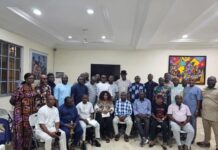Lere Olayinka, the Senior Special Assistant on Public Communications and New Media to the Minister of the Federal Capital Territory (FCT), Nyesom Wike, has issued a fiery challenge to individuals and groups alleging land grabbing by the Federal Capital Territory Administration (FCTA). In a statement released Wednesday, Olayinka called on these claimants to provide concrete evidence of their ownership, as allegations of illegal land acquisition swirl on social media platforms.
The statement is a response to a viral video highlighting a contentious parcel of land, Plot No. 2241, situated in Life Camp, Gwarimpa District, Cadastral Zone C02, Abuja. Olayinka’s revelations not only question the legitimacy of the claims but also expose a deeply intricate history surrounding the property.
Plot No. 2241: A 40-Year-Old Saga
According to Olayinka, the land in question has a documented history dating back to 1984. Initially granted under a Temporary Right of Occupancy, the plot was occupied by a construction company, Paulosa Nigeria Limited, which used it as a temporary office. However, the company went beyond its temporary rights, constructing permanent structures and renting them out—actions carried out without formal government approval for over three decades.
The turning point came in November 2020, when Paulosa Nigeria Limited applied for a conversion of the temporary right to a Statutory Right of Occupancy. The FCTA granted this request on February 1, 2023, subject to the fulfilment of specific financial and legal conditions, including:
Ground Rent of ₦50,000/m² for 2022 and 2023, totalling ₦2,332,143.
Premium Payment of ₦500/m², amounting to ₦11,660,715.
Accumulated Ground Rent from 1984 to 2021 (37 years), totalling ₦43,144,645.
Failed Compliance and Revocation
Despite the approval, Paulosa Nigeria Limited reportedly failed to meet these terms within the stipulated timeline. This non-compliance led to the revocation of the Right of Occupancy on October 10, 2024, a full 20 months after the initial approval.
“From the above,” Olayinka emphasised, “it should be clear that Paulosa Nigeria Limited never at any time owned the land.” He drew a compelling analogy: “If a student offered admission to a university fails to pay the stipulated fees or fulfil other terms, can the student claim to be a bonafide student of the university?”
This remark underscores the FCTA’s position that occupancy rights are contingent on adherence to terms and conditions—not perpetual entitlements.
The War Against Misinformation
Olayinka did not mince words in addressing the role of social media in fuelling the land-grabbing narrative. He specifically targeted self-proclaimed human rights activists, urging them to conduct thorough investigations before disseminating claims.
“My advice to our social media emergency human rights advocates is that they should always endeavour to investigate claims by whoever is seeking their service,” he stated.
He further lambasted an unnamed online activist for spreading misinformation, derisively referring to the individual as someone who studied “Baseless Black-market Law.” Olayinka argued that such characters harm public discourse by promoting unfounded allegations.
The Case of Misuse and Contravention
Another contentious case highlighted by Olayinka involves land originally allocated for a recreation park. Allegedly, this parcel was repurposed for building a school and a church—a direct violation of its designated use.
“Our online lawyer would have been properly schooled,” Olayinka remarked, “that such actions are a clear contravention of the conditions under which the land was allocated.”
This statement underscores a broader concern: the misuse of allocated lands across Abuja. The FCTA has consistently grappled with balancing urban development, adherence to land use policies, and combating illegal encroachments.
Implications for Urban Development in Abuja
This dispute over Plot No. 2241 is emblematic of broader challenges facing land administration in the FCT. The rapid urbanisation of Abuja has made land a highly contested asset, with frequent clashes between private developers, government agencies, and local communities.
The case also raises important questions about the integrity of temporary occupancy arrangements, which often morph into de facto ownership due to lax enforcement. By revoking the right of Paulosa Nigeria Limited, the FCTA sends a strong message about its commitment to reclaiming improperly utilised lands.
Wike’s Stance on Urban Reforms
Under the stewardship of Nyesom Wike, the FCTA has adopted a more aggressive approach to urban reforms. This includes addressing illegal structures, reclaiming public spaces, and enforcing compliance with land use regulations.
Olayinka’s statement is reflective of this broader strategy, as it seeks to dispel misinformation while reinforcing the administration’s determination to uphold transparency and accountability.
Conclusion: A Cautionary Tale
The saga of Plot No. 2241 serves as a cautionary tale for stakeholders in Abuja’s real estate sector. It highlights the importance of adhering to land policies and the risks of non-compliance.
For social media activists, the incident underscores the need for due diligence and balanced reporting. In an era where misinformation can spread like wildfire, the role of responsible journalism and advocacy cannot be overstated.
As the dust settles on this dispute, one thing remains clear: the FCTA under Wike’s leadership is poised to take a hard stance against irregularities, ensuring that Abuja’s urban landscape reflects order, fairness, and compliance.











